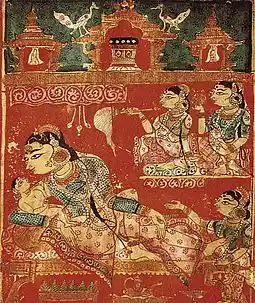Mahavir Jayanti: Birth of an enlightened soul
Mahavir Jayanti is one of the most important festivals for the Jain community. The festival symbolises their faith and commitment to the high ideals of Lord Mahavira who preached non-violence and non-attachment. This is the story behind the famous festival.

Birth of Mahavira from Kalpa Sutra (c. 1375–1400 CE) Source: Wikimedia Commons
We commemorate the birth of Lord Mahavira, the 24th and last Tirthankara of this cosmic cycle, and the founder of Jainism. This is one of the most significant Jain festivals because it marks the birth of the enlightened soul who established the groundwork for the community that exists today. The birth anniversary of Mahavir is more fervently honoured in Gujarat and Rajasthan owing to the larger concentration of Jains in these states.
Lord Mahavir was conceived by Devananda, the wife of Brahmin Rishabhdeva, and the embryo was miraculously transplanted to Queen Trisala's womb. Queen Trisala experienced a series of auspicious dreams, all of which predicted the arrival of a noble soul. On the thirteenth day of the rising moon in Chaitra, he was born as Vardhaman in Kundalagrama, Bihar, as the son of King Siddartha and Queen Trishala of the Ikshvaku Dynasty. His parents were followers of Parshvanatha, the 23rd Tirthankara.
He relinquished his kingship and otherworldly things at the age of 30, and spent twelve years as an ascetic until attaining Kevala Jnana (omniscience) beneath a Sala tree on the bank of the River Rijubalika near Jrimbhikagrama at the age of 43. He taught that the vows of ahimsa (nonviolence), satya (truth), asteya (non-stealing), brahmacharya (chastity), and aparigraha (nonattachment) are required for spiritual emancipation. Mahavira emphasized nonviolence and showed the utmost regard for all living creatures. He also showed tremendous mastery over his senses, earning him the moniker 'Mahavira'. His earliest students were the eleven Ganadharas, a group of eleven Brahmins.
Mahavira's nirvana occurred at the age of 72 in the town of Pawapuri in present-day Bihar. Jains honour his life and the night of his nirvana as Diwali at the same time as Hindus do. One of Mahavira's greatest pupils, Gautama, is supposed to have obtained omniscience the night Mahavira attained nirvana in Pawapuri, Bihar.
Jains and followers all over the globe commemorate it with magnificent processions that may include chariots, horses, elephants, drummers, and chanters. On this day, silent prayers are also given, and his message is recapitulated in the form of sermons to his disciples. To commemorate the holiday, traditional Mahavir Jayanti delicacies are also cooked. Jains celebrate Mahavir Jayanti in a colorful style, adorning Jain temples with flags and giving charity to the underprivileged.
Donations are gathered in order to spare animals from killing. Early in the morning, devotees bathe Lord Mahavira's statue, known as the 'abhishek’ ceremony. The statue is then brought out in a parade in a gorgeously adorned cradle. The day concludes with individuals meditating and praying at a shrine, temple, or community space. On this day, people attempt to remember Lord Mahavir's teachings and make commitments that they would not harm anybody in the future, both consciously and inadvertently.

Jal Mandir in Pawapuri, Bihar. The city where Mahavir attained nirvana. Source: Wikimedia Commons


